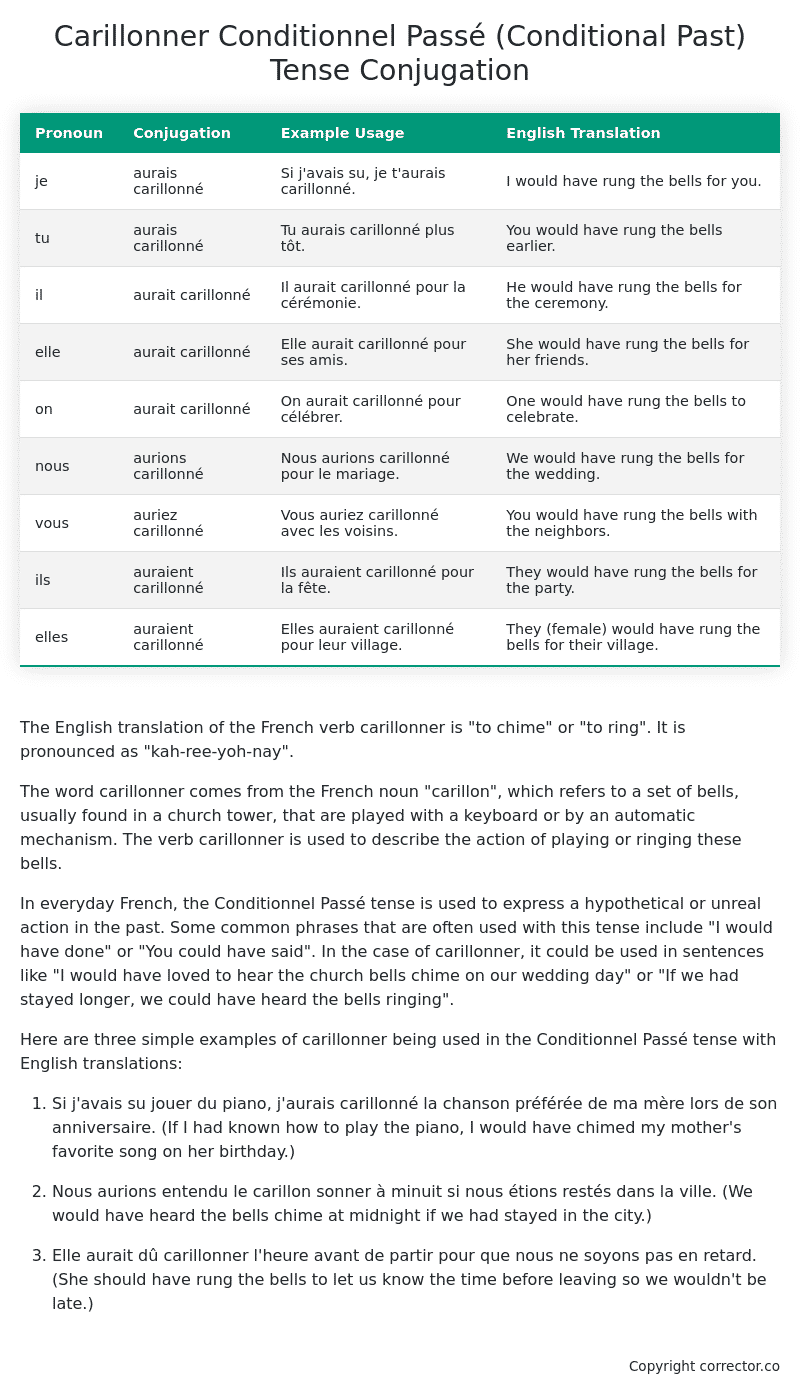Conditionnel Passé (Conditional Past) Tense Conjugation of the French Verb carillonner
Introduction to the verb carillonner
The English translation of the French verb carillonner is “to chime” or “to ring”. It is pronounced as “kah-ree-yoh-nay”.
The word carillonner comes from the French noun “carillon”, which refers to a set of bells, usually found in a church tower, that are played with a keyboard or by an automatic mechanism. The verb carillonner is used to describe the action of playing or ringing these bells.
In everyday French, the Conditionnel Passé tense is used to express a hypothetical or unreal action in the past. Some common phrases that are often used with this tense include “I would have done” or “You could have said”. In the case of carillonner, it could be used in sentences like “I would have loved to hear the church bells chime on our wedding day” or “If we had stayed longer, we could have heard the bells ringing”.
Here are three simple examples of carillonner being used in the Conditionnel Passé tense with English translations:
-
Si j’avais su jouer du piano, j’aurais carillonné la chanson préférée de ma mère lors de son anniversaire. (If I had known how to play the piano, I would have chimed my mother’s favorite song on her birthday.)
-
Nous aurions entendu le carillon sonner à minuit si nous étions restés dans la ville. (We would have heard the bells chime at midnight if we had stayed in the city.)
-
Elle aurait dû carillonner l’heure avant de partir pour que nous ne soyons pas en retard. (She should have rung the bells to let us know the time before leaving so we wouldn’t be late.)
Table of the Conditionnel Passé (Conditional Past) Tense Conjugation of carillonner
| Pronoun | Conjugation | Example Usage | English Translation |
|---|---|---|---|
| je | aurais carillonné | Si j’avais su, je t’aurais carillonné. | I would have rung the bells for you. |
| tu | aurais carillonné | Tu aurais carillonné plus tôt. | You would have rung the bells earlier. |
| il | aurait carillonné | Il aurait carillonné pour la cérémonie. | He would have rung the bells for the ceremony. |
| elle | aurait carillonné | Elle aurait carillonné pour ses amis. | She would have rung the bells for her friends. |
| on | aurait carillonné | On aurait carillonné pour célébrer. | One would have rung the bells to celebrate. |
| nous | aurions carillonné | Nous aurions carillonné pour le mariage. | We would have rung the bells for the wedding. |
| vous | auriez carillonné | Vous auriez carillonné avec les voisins. | You would have rung the bells with the neighbors. |
| ils | auraient carillonné | Ils auraient carillonné pour la fête. | They would have rung the bells for the party. |
| elles | auraient carillonné | Elles auraient carillonné pour leur village. | They (female) would have rung the bells for their village. |
Other Conjugations for Carillonner.
Le Present (Present Tense) Conjugation of the French Verb carillonner
Imparfait (Imperfect) Tense Conjugation of the French Verb carillonner
Passé Simple (Simple Past) Tense Conjugation of the French Verb carillonner
Passé Composé (Present Perfect) Tense Conjugation of the French Verb carillonner
Futur Simple (Simple Future) Tense Conjugation of the French Verb carillonner
Futur Proche (Near Future) Tense Conjugation of the French Verb carillonner
Plus-que-parfait (Pluperfect) Tense Conjugation of the French Verb carillonner
Passé Antérieur (Past Anterior) Tense Conjugation of the French Verb carillonner
Futur Antérieur (Future Anterior) Tense Conjugation of the French Verb carillonner
Subjonctif Présent (Subjunctive Present) Tense Conjugation of the French Verb carillonner
Subjonctif Passé (Subjunctive Past) Tense Conjugation of the French Verb carillonner
Subjonctif Imparfait (Subjunctive Imperfect) Tense Conjugation of the French Verb carillonner
Conditionnel Présent (Conditional Present) Tense Conjugation of the French Verb carillonner
Conditionnel Passé (Conditional Past) Tense Conjugation of the French Verb carillonner (this article)
L’impératif Présent (Imperative Present) Tense Conjugation of the French Verb carillonner
L’infinitif Présent (Infinitive Present) Tense Conjugation of the French Verb carillonner
Struggling with French verbs or the language in general? Why not use our free French Grammar Checker – no registration required!
Get a FREE Download Study Sheet of this Conjugation 🔥
Simply right click the image below, click “save image” and get your free reference for the carillonner Conditionnel Passé tense conjugation!

Carillonner – About the French Conditionnel Passé (Conditional Past) Tense
Formation
Common Everyday Usage Patterns
Expressing Unreal Past Scenarios
Polite Requests or Suggestions
Expressing Doubt or Uncertainty
Interactions with Other Tenses
Conditional Present
Indicative Past Tenses
Conditional Future
Summary
Want More?
I hope you enjoyed this article on the verb carillonner. Still in a learning mood? Check out another TOTALLY random French verb conjugation!


